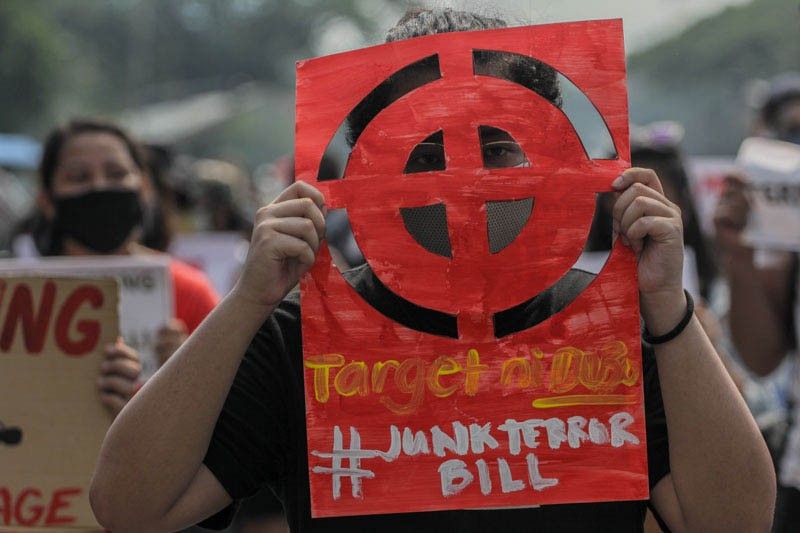IBP: Parts of anti-terrorism bill 'contrary to Constitution'

MANILA, Philippines — Designating judicial powers to the Anti-Terrorism Council, under the controversial new terror bill, violates the Constitution and the principles of checks and balances, the Integrated Bar of the Philippines said.
IBP president Domingo Egon Cayosa warned that the anti-terrorism bill, approved by Congress and transmitted to the Palace for President Rodrigo Duterte’s signature on Tuesday, contains provisions that run contrary to the Constitution.
Cayosa said the IBP raised the Constitutional infirmities of the bill to Senate President Vicente “Tito” Sotto III and House Speaker Alan Peter Cayetano.
But if the president would sign it into law, “we have no other recourse but to bring to the Supreme Court the Constitutional issues that need to be decided,” he said an interview with CNN Philippines’ "Newsroom Ngayon" on Monday.
Here are some of the provisions that Cayosa highlighted:
Anti-Terrorism Council and judicial powers
“The most glaring that may be contrary to the Constitution is the Anti-Terrorism Council (ATC),” Cayosa said in Filipino.
The Anti-Terrorism Council is chaired by the executive secretary, and composed of secretaries of justice, foreign affairs, national defense, the interior and local government and finance, and the national security advisor.
The Human Security Act of 2007, which the anti-terrorism bill seeks to repeal, also allows the creation of the council.
The panel, under the looming new law, gives the panel more powers.
“If they (council) designate you as a terrorist or terrorist organization, based on probable cause, that is a signal and excuse now for law enforcers to arrest, conduct surveillance, limit your travel and even the [Anti-Money Laundering Council] to freeze your assets, and the detention may be allowed to a maximum of 24 days without court charges,” he said in a mix of English and Filipino.
Under the Human Security Act of 2007, law enforcers may be authorized by the ATC in writing to take custody of a person “charged with or suspected of the crime of terrorism or the crime to commit terrorism...deliver the charged or suspected person to the proper judicial authority within a period of three days.”
But under the proposed anti-terrorism bill, this detention can last up to 24 days.
“In our Constitution, even if the writ of habeas corpus has been suspended, in the extraordinary circumstance when there is martial law, if you are arrested, you have to be charged within three days,” Cayosa said.
“The question is, can the Congress create a new agency that is not a court, not part of the Judiciary, and give it Judicial power?” he added.
Proscription of terrorists, terrorist organizations
Under the Human Security Act, organizations or persons “organized for the purpose of engaging in terrorism” as defined by the law, shall be declared as a terrorist upon application of the Department of Justice before a trial court. The proscription will be conducted “with due notice and opportunity to be heard” or a hearing will be conducted.
RELATED: DOJ pursuing terror tag on 600 'CPP-NPA leaders' | From 649 to 8: DOJ cuts communist terror list
The proposed bill meanwhile holds that where the Court “has determined that probable cause exists on the basis of the verified application,” the order of proscription of being a terrorist may be issued, within 72 hours.
Cayosa said that the ATC, under the new law, can designate a person as terrorist, and would be the basis for arrest.
“It should not be that law enforcers would decide on who can be arrested. That is why that is given to the Judiciary, given to an independent co-equal body. That’s check and balances,” he said.
While Cayosa said that being labelled as a terrorist would not be easy since the council is composed of key government officials, “under the hands of an abusive government, it can still happen.”
The defense department and military officials have long and repeatedly accused activist groups, as well as human rights organizations, rights lawyers and even journalists, of being "communust terrorists" or their sympathizers.
- Latest
- Trending































